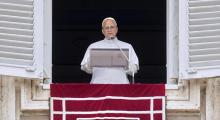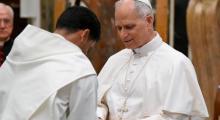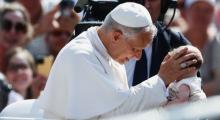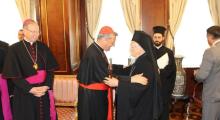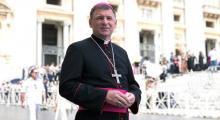Issued by the Catholic Center for Studies and Media - Jordan. Editor-in-chief Fr. Rif'at Bader - موقع أبونا abouna.org
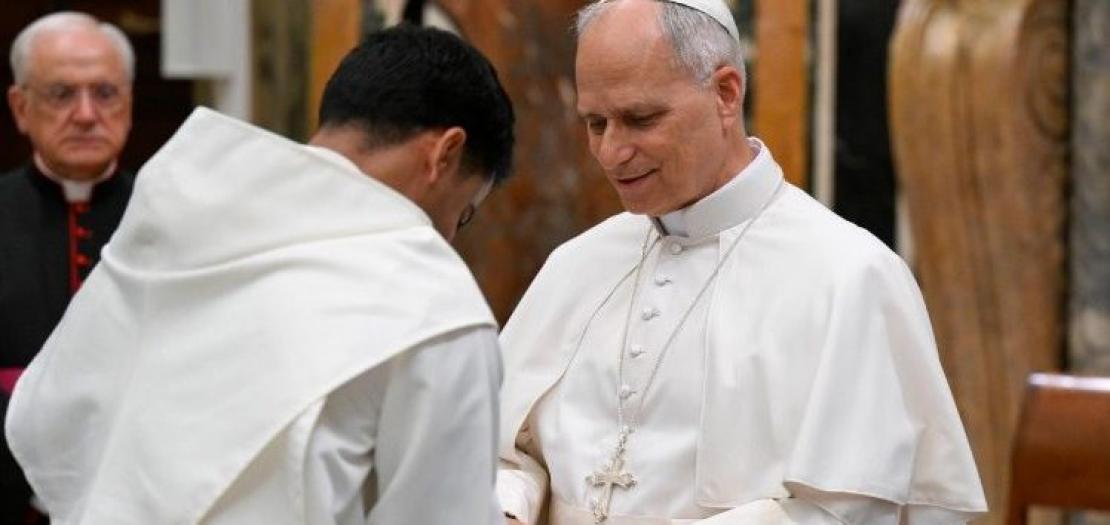
Never forget those persecuted for their faith, and never cease your efforts to bring them consolation.
Pope Leo XIV made this appeal when receiving religious of the Order of Friars Minor Conventual (Conventual Franciscans) and the Order of the Most Holy Trinity and of the Captives (Trinitarians), on the occasion of their respective General Chapters on Friday morning in the Vatican.
In his remarks, the Holy Father commended them for their faith, their work abroad, and their closeness to those lacking religious freedom in those regions of the world.
The Holy Father likewise encouraged the Friars in their service empowered by Christ. "Listen to Him in the voice of your brother, in the discernment of the community, in attentiveness to the signs of the times, in the appeals of the Magisterium," Pope Leo said.
Be living reminders of need to praise God
Addressing them as "dear sons of Saint Francis of Assisi," Pope Leo encouraged them, reminding "each personally and in every one of your fraternities, to be a living reminder of the primacy of the praise of God in Christian life." Moreover, the Holy Father also remembered that the Conventuals are celebrating the anniversary of their renewed presence in the Far East.
The Holy Father marveled that welcoming both Franciscans and Trinitarians together reminded him of a painting in the apse of the Basilica of St. John Lateran, which depicts an audience in which Pope Innocent III receives Saint Francis and Saint John of Matha together, to honor their great contribution to the reform of religious life.
He remembered that Saint Francis is depicted kneeling with an enormous open book, "almost as if he were saying to the Pontiff: 'Your Holiness, I only ask to live the rule of the Holy Gospel sine glossa (without gloss),'" whereas Saint John of Matha, on the other hand, is standing and holding the Rule that he drafted together with the Pope.
Here, Pope Leo observed, Saint Francis demonstrates his docility to the Church by presenting his project not as his own but as a divine gift, Saint John of Matha shows the approved text, the result of study and discernment, as the culmination of a necessary effort to fulfill the purpose inspired by God.
Two attitudes are not conflicting but illuminate one another
"These two attitudes, far from being in conflict," Pope Leo insisted, "illuminate one another and have served as a guiding principle for the service that the Holy See has rendered ever since in support of all charisms."
“These two attitudes, far from being in conflict illuminate one another and have served as a guiding principle for the service that the Holy See has rendered ever since in support of all charisms”
In these two saints, the Holy Father said, God not only inspired "a spiritual path of service," but also "the desire to engage with the Successor of Peter regarding the gift received from the Spirit in order to place it at the Church’s disposal."
"Saint Francis," the Pope said, "presents to the Pope the need to follow Jesus without reserve, without ulterior motives, without ambiguity or manipulation," while St John of Matha expressed this truth "with words that would later prove foundational," and "that Saint Francis would make his own," including the call to live “without anything of one's own,” with nothing “hidden in the pocket or in the heart."
Those lacking religious freedom
The Pope recalled that the Trinitarians have chosen to focus on bringing consolation to those who cannot live their faith freely, remembering that over these past months, they have prayed about this desire, following the words of Saint Paul: “Persecuted, but not abandoned; struck down, but not destroyed” (2 Corinthians 4:9), which, he acknowledged, inspire the theme of their chapter.
"I join in this prayer and also ask God the Trinity that one of the fruits of your assembly be to never cease remembering in your prayers and in your daily efforts those who are persecuted for their faith."
“I join in this prayer and also ask God the Trinity that one of the fruits of your assembly be to never cease remembering in your prayers and in your daily efforts those who are persecuted for their faith.”
That part referring to the persecuted, according to the teaching of Saint Augustine, Pope Leo underscored, "is the portion that belongs to God and defines the vocation of the liberator of His people." (cf. Questions on the Heptateuch, Book II, 15).
"Moreover, this orientation toward the members of the Church who suffer the most," the Holy Father said, "will draw the attention of vocations, of the faithful, and of people of good will to this reality, and will keep you available for the frontier services that you carry out in the Arabian Peninsula, the Middle East, Africa, and the Indian subcontinent."
'Christ should drive us'
The Pope also thanked the Friars Minor Conventual for “speaking of the things of God.”
"It is not our personal interest that should drive us," the Pope said, "but that of Christ; it is His Spirit we must first listen to, in order to “write the future in the present..."
“"It is not our personal interest that should drive us, but that of Christ; it is His Spirit we must first listen to, in order to 'write the future in the present'”
"Listen to Him in the voice of your brother, in the discernment of the community, in attentiveness to the signs of the times, in the appeals of the Magisterium," the Pope said.
Before imparting his Apostolic Blessing, Pope Leo concluded the meeting recalling the Praises of the Most High God, the trisagion, written by Saint Francis, which reads, “You are holy, Lord, the only God, who works wonders. You are strong, You are great, You are the Most High, You are the almighty King, You, Holy Father, King of Heaven and Earth.”


